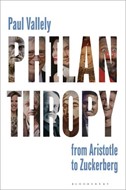The title of the Paul Vallely’s latest book is ‘Philanthropy from Aristotle to Zuckerberg’.
 We were delighted to have Paul, well-known British writer on religion, ethics, Africa and development issues, lead a Zoom session about his book on October 6th. It turned out to be a fascinating sweep of the history of philanthropy and generated a number of questions and comments after Paul had finished speaking.
We were delighted to have Paul, well-known British writer on religion, ethics, Africa and development issues, lead a Zoom session about his book on October 6th. It turned out to be a fascinating sweep of the history of philanthropy and generated a number of questions and comments after Paul had finished speaking.
He started out with the Graeco-Roman world and Aristotle. Aristotle argued that giving to the poor was about building the good character of the giver – rather than anything to do with improving the lot of the poor! Roman culture was much influenced by the Greeks and they took the same approach – and it was also often used to enhance the reputation of the giver. Paul used the term ‘strategic philanthropy’ to describe this kind of giving.
There was a completely different strand of philanthropy in Hebrew culture. In the Torah there is one word that covers both of what we understand as ‘charity’ and ‘justice’. It is very much concerned with building the community for all – a process in which all have obligations. Paul termed this ‘reciprocal philanthropy’.
As Christianity took root across the Roman world the reciprocal philanthropy approach became prevalent. For Basil (d.379CE) giving to the poor was a matter of justice and this way of thinking was still being codified 6 centuries later by Gratian.
The Renaissance, reformation and the rise of capitalism led to a swing back to strategic philanthropy. In Victorian times it became for many rich individuals ‘scientific philanthropy’ and was seen as a vehicle for social control. Andrew Carnegie, who was a believer in Herbert Spencer’s ‘Social Darwinism (it was Spencer who coined the term ‘survival of the fittest-not Darwin). Carnegie’s philanthropy focused on the social infrastructure of culture and arts – it was not about changing the lot of the poor.
So it has continued to contemporary times. Now, there are many ‘corporate’ philanthropists – but it is very much strategic philanthropy – mainly corporate PR.
One notable exception that Paul drew our attention to is Scott Mackenzie. She obtained a vast fortune as part of her divorce settlement from Jeff Bezos of Amazon. The system she has set up to implement her philanthropy involves deciding what issues to spend money on and then giving money to organisations where she feels there is strong leadership. It is much more closely aligned with the biblical tradition of giving.
There are still many questions (such as the accountability of rich people deciding where they will give their money). What Paul did in his talk was give us all the background to help better frame the debate about modern day philanthropy and the continuing role for both giving to charity and working for social justice.
 The book is available from many good booksellers.
The book is available from many good booksellers.
Online you can, of course, buy it from Amazon. But it is also available from a number of online booksellers. If you are not keen on Amazon then why not try one of these – such as http://www.hive.co.uk/ . Hive supports local independent booksellers.
Wished you were there?
You can view a video of Paul’s talk on our YouTube channel.
It lasts about 35 minutes in total.
View video
